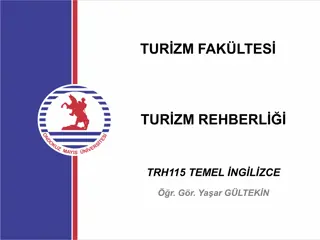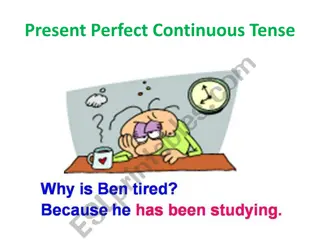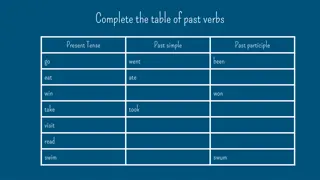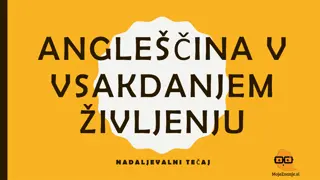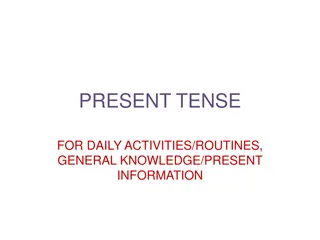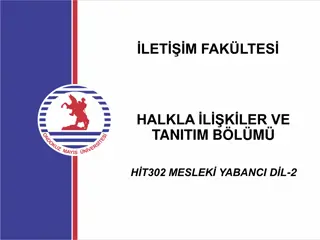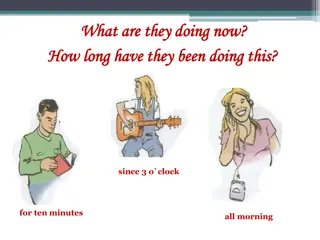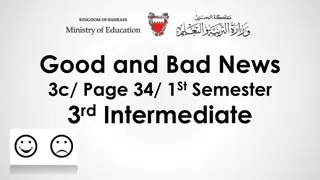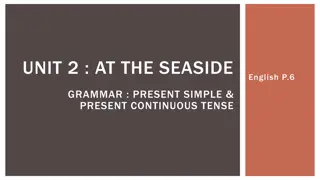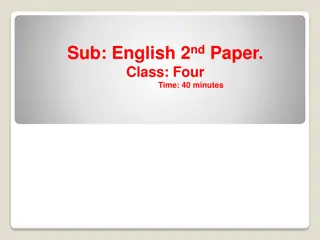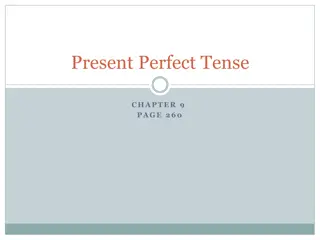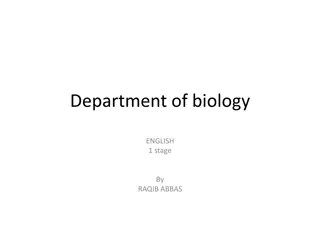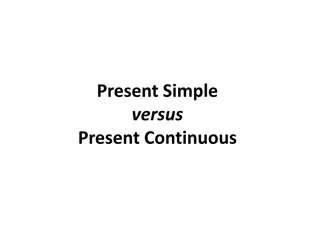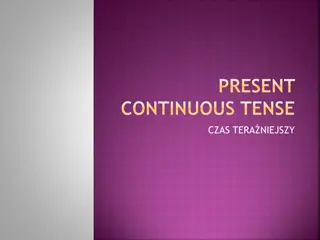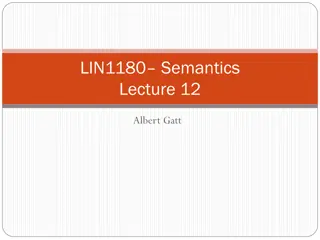Understanding Present Perfect Continuous Tense and Usage of Some and Any
Describing the present perfect continuous tense, this content explains how to form, ask questions, and use negatives in this tense. Additionally, it covers the usage of "some" and "any" in sentences. Synonyms are also discussed to help expand vocabulary knowledge.
Uploaded on Sep 09, 2024 | 0 Views
Download Presentation

Please find below an Image/Link to download the presentation.
The content on the website is provided AS IS for your information and personal use only. It may not be sold, licensed, or shared on other websites without obtaining consent from the author. Download presentation by click this link. If you encounter any issues during the download, it is possible that the publisher has removed the file from their server.
E N D
Presentation Transcript
department of pathological analyzes
Present perfect continuous tense The present perfect continuous tense is used to describe ongoing or continuous actions that started in the past, continue in the present, and may or may not continue into the future. It is formed by combining "have/has been" with the present participle (-ing form) of the verb. S_+ have/has +been + present participle (-ing form) + C .. For example I have been studying for three hours. They have been playing games since morning. He has been drawing pictures since breakfast. The cat has been sitting on the windowsill all evening. I have been writing in my journal today. He has been writing a novel since the beginning of the year. We have been working on our garden tirelessly. I have been waiting for the bus since 7 a.m. He has been practicing the piano for weeks.
Question When asking a question in the present perfect continuous tense, we invert the subject and auxiliary verb "have/has" and add a question mark at the end. For example: Have you been studying all night? Has he been working on that project for a long time? Have you been watching TV all day? Have they been playing video games since morning? Have we been practicing the piano every day? Have they been laughing at jokes the whole time?
Negative The present perfect continuous negative form is used to express that an action or activity, which began in the past and has been ongoing, is not happening or hasn't been occurring. This structure is formed by using Subject + has/have not been + present participle Ex: I have not been studying for the exam. They have not been working on the project since last month. She has not been living in this city for five years. The team has not been practicing tirelessly. He has not been learning a new language lately. We have not been exploring different cuisines.
Some : it is used with positive sentences ,offering and requesting. Ex: I want some rice. Would you like some tea? Can you give me some information? I need some help with cleaning my house. Can I borrow some money? There is some milk left in the fridge
Any : it is used with negative and interrogative statements. Ex: I don t want anyone. Do you have any tea? Is there any information available? I don't have any chocolate left. Do you have any plans for the weekend? He didn't give me any details. Is there any way we can finish this earlier?
Synonyms Synonyms: are words that have a similar meaning to another word. Word | Synonyms | | ----------- | ----------- | |Happy | Joyful, pleased | |Big | Large, huge, massive | |Funny | amusing, comical | | Brave | Courageous | Smart | Intelligent | Angry | Furious | Fast | Rapid | Honest | Truthful | Beautiful | Attractive
Antonyms Antonyms: are words that have the opposite meaning to another word. |Word | Antonyms | | ----------- | ----------- | |Hot | Cold, freezing | |Good | Bad, terrible | | Happy | Sad | Big | Small | Brave | Cowardly | Smart | Dull , stupid | Beautiful | Ugly | Angry | Calm | Fast | Slow | Friendly | Hostile | Honest | Dishonest | Cold | Warm
past perfect tense The past perfect tense is used to indicate an action that was completed before another action took place in the past. It is formed by using the auxiliary verb "had" followed by the past participle of the main verb. For example: S + had + P.P + C She had finished her homework before going to bed. Before I arrived, they had already eaten dinner. He had forgotten his keys after locking the door. They had already left by the time I arrived. He had read the book before watching the movie adaptation. By the time we reached the restaurant, they had already closed. I had never seen such a beautiful sunset before visiting that beach. They had lived in the city for ten years before moving to the countryside.
question To form a past perfect question, we use the auxiliary verb "had" followed by the subject and then the past participle of the main verb. Had you finished your dinner before the guests arrived? Had he left the office before you called him? Had they cleaned the house before their parents came home? Had you already packed your bags before the trip was canceled? Had they discussed the project before the meeting began? Had she completed the application before the deadline? Had you visited the museum before it closed for renovations? Had they prepared the presentation before the conference started? Had he returned the book to the library before it was due?
negative To form the past perfect negative, we use the auxiliary verb "had" followed by "not" (contracted as "hadn't") and then the past participle of the main verb. They hadn't finished their homework before the party started. She hadn't left the office by the time you arrived. We hadn't completed the project before the deadline. He hadn't eaten breakfast when you called him. You hadn't visited Paris before you went to Rome. They hadn't finished the race before the rain started. She hadn't heard the news before you told her. He hadn't booked his tickets before the concert was announced. They hadn't discussed the project before the meeting began. You hadn't packed your bags before the trip was canceled.
past perfect continuous The past perfect continuous tense is used to describe an action or event that started in the past, continued for some time, and was still ongoing at a specific point in the past. It emphasizes the duration or continuous nature of the action leading up to that point in time. Subject+had been+present participle (base verb + ing )+additional information She had been studying for hours when the power went out. She had been working at the company for five years before she decided to quit. By the time they arrived at the party, he had been waiting for over an hour. The children had been playing in the garden all afternoon before it started to rain. They had been studying Spanish for months before they finally traveled to Spain. By the time I got home, my roommate had been cooking dinner for hours. The team had been practicing diligently for weeks before the big competition She had been jogging every morning until she injured her knee.
Question question in the past perfect continuous tense, you typically start with "had " followed by the present participle form of the main verb and then the subject. For example: Had they been waiting for a long time before the bus arrived? Had she been practicing piano before the concert last night? Had you been working on that project before the deadline? Had the children been playing outside when the rain started? Had he been living in Paris for many years before he moved to London?
Negative The past perfect continuous negative form is used to indicate that an action or event was not ongoing over a period of time leading up to a certain point in the past. (To form the negative, you typically use "had not been" followed by the present participle form of the main verb) example: She hadn't been studying for very long before she decided to take a break. They hadn't been talking for hours before they finally reached a compromise. He hadn't been exercising regularly before he started feeling out of shape. We hadn't been driving for more than an hour before the car broke down. She hadn't been cooking for very long before she burned the dinner. The team hadn't been practicing hard enough before the important match. They hadn't been studying Spanish before they moved to Madrid. He hadn't been saving money before he lost his job


